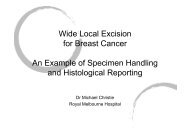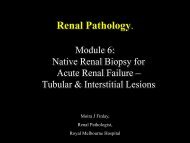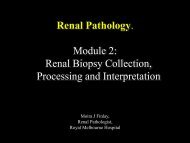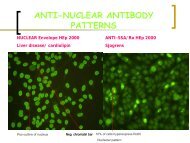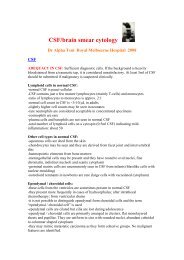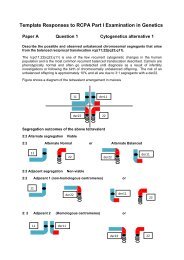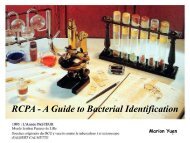Model Answers Microbiology Written examinations 2007 - RCPA
Model Answers Microbiology Written examinations 2007 - RCPA
Model Answers Microbiology Written examinations 2007 - RCPA
Create successful ePaper yourself
Turn your PDF publications into a flip-book with our unique Google optimized e-Paper software.
Serological methods for detection of deep seated mycoses.<br />
1. List of deep seated mycoses. Candida sp, paracoccidiomycosis,<br />
histoplasmosis, zygomycosis including mucormycoses eg mucor, rhizopus,<br />
phycomycoses , aspergillosis. The type of mycosis will depend on the<br />
geographical region as some strains are very location dependent.<br />
2. Occurrence: Many of these infections occur in immunocompromised patients<br />
so the detection of IgM and Ig G antibodies is unreliable even if there were<br />
good antigens available to detect antibodies produced against these organisms.<br />
3. Serology is defined as the detection of antibodies or antigens in serum<br />
4. Commercial serological tests available: Candida antibodies latex<br />
agglutination) , galactomannin (detecting aspergillus antigen EIA),<br />
Histoplasma antibodies (CF), western blot,<br />
Microbial hazards associated with use of rain water tanks<br />
Airborne microbes and chemicals can enter rainwater tanks via water collection<br />
processes either directly from the atmosphere or indirectly by leaching of materials<br />
from water collection surfaces animal excreta, debris and organic waste can also<br />
accumulate. Biofilm will form when the concentration of dissolved organics falls<br />
below 25mg/L. these develop complexity in time and they may assist in removing<br />
contaminants but there has been little work undertaken to examine this. There is<br />
current research starting to examine this issue.<br />
Microbes found in water tanks are likely to survive because of the lack of inhibiting<br />
substances, eg chlorine, the absence of filters and the leaching of bird and animal<br />
excreta which may contain enteric bacteria such as salmonella, campylobacter and<br />
parasites such as Giardia, cryptosporidium<br />
Also risk of breeding of mosquitoes spreading dengue, malaria, RRV, BF, other<br />
arbovirus infections.<br />
Please leave feedback<br />
See next page



